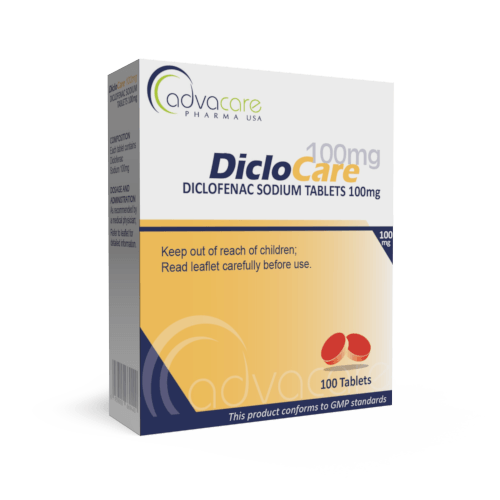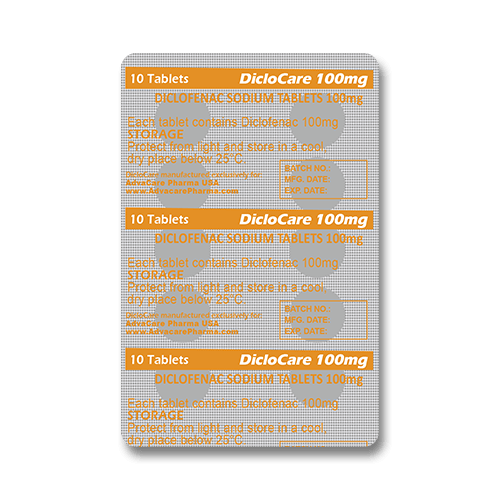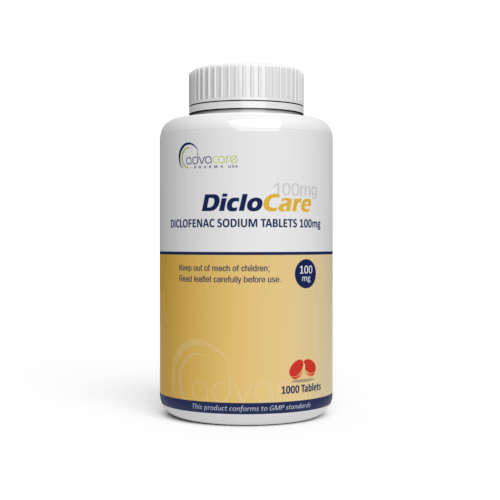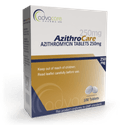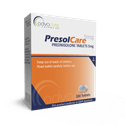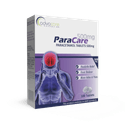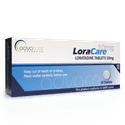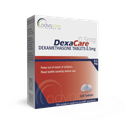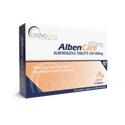- Home›
- Pharmaceuticals›
- Pharmaceutical Tablets›
- Diclofenac Sodium Tablets
Diclofenac Sodium Tablets
Dosage
Packaging
What is Diclofenac Sodium?
Active Ingredients: Diclofenac Sodium
Diclofenac Sodium Tablets are a nonsteroidal anti-inflammatory drug (NSAID) used to manage mild to moderate acute pain from kidney stones, arthritis, joint pain, gout, dysmenorrhea, or injuries. This medication may be used as a monotherapy or with opioid analgesics to treat moderate to severe pain.
As an NSAID, diclofenac sodium displays analgesic, anti-inflammatory, and antipyretic properties.
Though the exact mechanism of action is not fully known, it is known to inhibit cyclooxygenase (COX-1 and COX-2). This inhibits the production of prostaglandins, which are involved in inflammation and pain signaling.
AdvaCare Pharma is a manufacturer and exporter of GMP-certified Diclofenac Sodium Tablets and other pharmaceuticals. We offer a wide range of high-quality and cost-effective medical supplies that are available for distribution.
Why are we a trusted Diclofenac Sodium manufacturer?
As a reputable Diclofenac manufacturer, we are dedicated to ensuring that GMP guidelines and standards strictly apply to the manufacture of our entire range of 200+ pharmaceutical treatments in tablet dosage form.
AdvaCare Pharma is an American pharmaceutical company committed to the manufacture of high-quality, affordable pharmaceuticals for a global market. The extensive international network that we partner with includes pharmaceutical distributors, hospitals, pharmacies, and a variety of other medical institutions. Our vision is to manufacture Diclofenac Sodium Tablets, and other quality-assured oral solid treatments, that get into the hands of those that need them most.
Uses
What is Diclofenac Sodium used for?
It is used to treat mild to severe pain associated with conditions like:
- kidney stones
- gout
- rheumatoid arthritis
- osteoarthritis
- ankylosing spondylitis
- dysmenorrhea
How are Diclofenac Sodium Tablets used?
This medication is intended to be taken orally. Diclofenac Sodium Tablets may be taken with or without food.
What dose should be given and for how long?
Adults Recommended dosage may vary based on different medical conditions:
- For relief of pain or dysmenorrhea, the recommended dosage is 50mg three times a day after an initial dose of 100mg. Treatment can be initiated at the first appearance of symptoms and continued for a few days.
- For the relief of osteoarthritis symptoms, the recommended dosage is 100-150mg/day in divided doses, such as 50mg twice or three times a day OR 75mg twice a day. The maximum daily dose is 150mg.
- For the relief of rheumatoid arthritis symptoms, the recommended dosage is 150-200mg/day in divided doses, such as 50mg three or four times a day. The maximum daily dose is 225mg.
- For the relief of ankylosing spondylitis symptoms, the recommended dose is 25mg four times a day with an additional 25mg before bed, if necessary. The maximum daily dose is 125mg.
Children (≥ 12 years) For the treatment of pain, the recommended dose is 25mg four times a day.
What happens if a dose is missed?
The missed dose should be taken as soon as possible. Skip the missed dose if it is almost time for the next scheduled dose. Do not take extra medicine to make up for missed doses.
The exact dosage and duration of treatment are based on the response to the treatment. Refer to a doctor or pharmacist for more specific guidelines on dosage. Do not exceed what they advise.
Diclofenac sodium is not interchangeable with other diclofenac potassium or diclofenac products; reassess the dose if switching between products.
Who can use Diclofenac?
Diclofenac can be administered to adults and children (≥ 12 years), but caution is advised for specific groups of patients.
Pregnant Diclofenac use is not recommended after 30 weeks gestation. Human and animal studies have shown diclofenac does cross the placenta.
NSAIDs, including diclofenac, increase the risk of premature closure of the fetal ductus arteriosus, fetal renal dysfunction, neonatal renal impairment, which may lead to limb contractures or delayed lung maturation. NSAID use during late pregnancy should be avoided. If diclofenac treatment is deemed medically necessary during the third trimester, doses should be the lowest necessary to produce benefit and treatment should be as short as possible.
Nursing Diclofenac is excreted in human milk in small amounts. The effects on nursing infants are currently unknown. Due to limited data, nursing while taking diclofenac should be done with caution.
Pediatric The safety and efficacy of diclofenac have not been established in pediatric patients < 12 years of age.
Geriatric Current data have not demonstrated differences in responses between older adults (≥ 65 years) and younger adults. However, due to the increased risk of adverse gastrointestinal (GI) and cardiovascular (CV) events, dosing in geriatric patients should be done with caution because of age-related decreases in organ function and concomitant disease and drug therapy. Close observation is recommended.
Other warnings
In patients with hepatic insufficiency, dosage reductions may be necessary, as diclofenac is primarily eliminated hepatically.
In patients with renal insufficiency, dosage adjustments may not be necessary.
Concomitant use of diclofenac with other prescription or over-the-counter NSAIDs is not recommended due to the increased risk of adverse GI events.
Clinical studies of various NSAIDs have shown an increased risk of serious CV thrombotic events, including myocardial infarction and stroke, which can be fatal. It is unclear if the risk of adverse CV events is similar for all NSAIDs. The increased risk of adverse CV events from NSAID use appears to be similar in those with and without CV disease or dysfunction, however, those with CV disease or dysfunction had higher incidences of adverse CV effects. These effects can begin as early as the first weeks of treatment and have mostly been observed at higher doses. To minimize the potential risk, the lowest effective dose should be used for the shortest duration possible. There is no evidence that concomitant use of aspirin can mitigate these risks and its use with diclofenac increases the risk of adverse gastrointestinal events.
Cases of severe hepatic reactions, including liver necrosis, jaundice, fulminant hepatitis with and without jaundice, and liver failure, some of which resulted in fatalities or liver transplantation have been reported with diclofenac use. Those who are female, taking doses ≥ 150mg, and taking diclofenac for longer than 90 days are at increased risk of hepatotoxicity.
Patients on long-term treatment should have their transaminase levels monitored at baseline and periodically throughout. Diclofenac treatment should be discontinued immediately if elevated hepatic transaminases persist or worsen, if signs or symptoms of liver disease develop, or if signs of systemic liver dysfunction occur.
Long-term NSAID use can result in renal papillary necrosis and other renal injury. Those with impaired renal function, heart failure, hypovolemia, liver dysfunction, dehydration, taking diuretics and ACE inhibitors or ARBs, and who are older are at a greater risk of developing renal toxicity. The effects are usually reversible with NSAID discontinuation.
NSAIDs, including diclofenac, can cause serious and potentially life-threatening gastrointestinal (GI) adverse events, including bleeding, inflammation, ulceration, and perforations of the esophagus, stomach, small intestine, or large intestine. Patients who are older, have a history of GI disease or bleeding disorders, consume ≥ 3 alcoholic beverages while taking this medication, or take dosages larger or longer than recommended are at a much greater risk for developing these conditions. Concomitant use of diclofenac with other NSAIDs, oral corticosteroids, aspirin, anticoagulants, selective serotonin reuptake inhibitors (SSRIs), or serotonin and norepinephrine reuptake inhibitors (SNRIs) can also increase the risk.
These serious adverse events can occur at any time, with or without warning symptoms, and only 1 in 5 patients are symptomatic. Most cases involve long-term treatment (3 months-1 year), but short-term use is not without risk. Diclofenac sodium should be discontinued immediately if a serious GI event is suspected or confirmed. The lowest effective dose should be used for the shortest duration possible to minimize the risk of adverse GI events.
NSAID use after coronary artery bypass graft is contraindicated due to the increased incidence of myocardial infarctions and strokes with NSAID use following surgery.
The antipyretic and anti-inflammatory effects of diclofenac may mask the clinical signs of present infection.
Side Effects
As with all pharmaceuticals, some unwanted effects can occur from the use of Diclofenac Sodium Tablets.
Common side effects include, but may not be limited to:
- nausea
- upset stomach
- headache
- dizziness
- drowsiness
- weight loss
- confusion
- sensitivity to the sun
- diarrhea
- tingling
- decreased appetite
Serious side effects may include:
- signs of an allergic reaction
- rash, fever, swollen glands, severe weakness, or jaundice
- signs of a heart attack or stroke (slurred speech, chest pain, weakness on one side of the body)
- flu-like symptoms
- signs of internal bleeding (bloody or black and tarry stools, vomiting blood)
For a comprehensive understanding of all potential side effects, consult a medical professional.
If any symptoms persist or worsen, or you notice any other symptoms, please call your doctor.
Precautions
Do NOT use Diclofenac Sodium Tablets if:
- You are allergic to diclofenac sodium or other NSAIDs.
- You have had an ulcer or bleeding in the digestive tract.
- You have asthma, kidney problems, or liver problems.
- You are treating pain caused by coronary artery bypass graft surgery.
Before treatment, consult your doctor regarding any medications you are taking to address potential drug interactions.Some products that may interact with diclofenac are ACE inhibitors, angiotensin II receptor blockers, corticosteroids, cidofovir, lithium, methotrexate and diuretics such as furosemide.
Avoid alcohol consumption or marijuana while taking diclofenac sodium which can make you drowsy.
This medication may not be suitable for people with certain conditions, so it is important to consult with a doctor if you have any health conditions.
References
Efficacy and safety of diclofenac sodium in rheumatoid arthritis. Experience in the United States
This is a nonsteroidal, anti-inflammatory drug that has been studied in 681 patients with rheumatoid arthritis. Out of these patients, 468 were enrolled in a five multicenter, double-blind parallel controlled investigation.
The results show that 150mg of diclofenac, is more effective than placebo. This drug has the same efficacy as 2.4g daily of ibuprofen or 3.6g daily of aspirin.
The conclusion of this study is that diclofenac sodium is safe in the treatment of rheumatoid arthritis.

You might be interested in...
Why AdvaCare Pharma?
As an industry leader, we are aware of our responsibility to provide affordable and sustainable solutions to improve healthcare worldwide.
